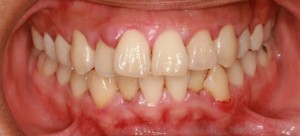
The main cause of gum disease is bacterial plaque, although smoking, stress, diet and other factors can also affect the health of your gums. The main types of gum disease are gingivitis and periodontitis.
Gingivitis
Gingivitis occurs when dental plaque builds up on the teeth, particularly where the gum joins the tooth. The signs of gingivitis are bleeding, redness and swelling of the gum.
In the early stage of gingivitis, bacteria in the plaque build-up, causes the gums to become inflamed (red and swollen) and often easily bleed during tooth brushing. Although the gums may be irritated, the teeth are still firmly planted in their sockets.
Periodontitis
When gingivitis is left untreated, it can advance to periodontitis. In a person with periodontitis, the inner layer of the gum and bone pull away from the teeth and form pockets that collect debris and bacteria that lead to infections.
As the disease progresses, the pockets deepen and more gum tissue and bone are destroyed. When this happens, teeth are no longer anchored in place, they become loose and tooth loss occurs. Gum disease, in fact, is the leading cause of tooth loss in adults.
Signs of periodontitis include bleeding, swelling and receding gums, along with bad breath, a bad taste in the mouth and loose teeth.
Because diabetes affects the body’s ability to use blood sugar, patients with this disease are at higher risk of developing infections, including periodontitis.
Medications can affect oral health because some lessen the flow of saliva, which has a protective effect on teeth and gums. Bad habits such as smoking make it harder for gum tissue to repair itself.
Poor oral hygiene habits such as not brushing and flossing on a daily basis, make it easier for gingivitis to develop.
Preventing gum disease
Cleaning your teeth everyday can help prevent gum disease. You should clean your teeth carefully every day with a soft, small-headed toothbrush, especially along the gum line where the gum meets the tooth.
The careful use of dental floss between teeth also helps remove plaque. Anti-bacterial mouth rinses can reduce bacteria in the mouth that cause plaque and gum disease.
Smokers are seven times more likely to get gum disease than non-smokers, so stopping smoking will decrease the risk and severity of gum disease.
Reducing stress also helps because stress makes it difficult for the body’s immune system to fight off infection. Maintaining a well-balanced diet also bolsters the immune system to fight infection.
Avoid clenching and grinding your teeth as this can put excess force on the supporting tissues of the teeth and increase the rate at which these tissues are destroyed.
Treatment
Like many conditions, early intervention to treat gum diseases can ensure the longevity of your teeth, so if you have swollen or bleeding gums or your teeth feel loose, see your dentist.
The dentist will examine your gums with a probe to measure the spaces between the tooth and gum. This will determine the health of your gums and supporting structures. If necessary, the dentist or oral health professional will instruct you in tooth cleaning techniques or may clean your teeth professionally to remove any plaque and calculus (hardened plaque).
It is important to attend a dentist for regular check-up appointments to enable them to monitor your oral health and detect any problems early on.
Comments are closed.